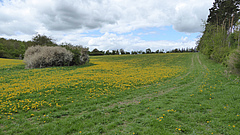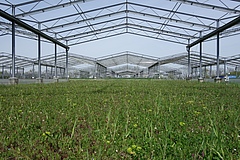Soil ecosystem more resilient when land managed extensively

According to the study, soil ecosystems are more resilient when extensively farmed. The photo shows a meadow in Thuringia (Picture: B. Schnabel)

Test plot with extensive grassland use in the GCEF field experiment overseen by the Helmholtz Centre for Environmental Research (UFZ) in Bad Lauchstädt. The roof structures simulate future climate conditions such as summer drought and warming (Picture: Marie Sünnemann)
Researchers studied the effects of intensive and extensive land use on soil biodiversity in cropland and grassland.
Based on a media release by Leipzig University
Compared to intensive land use, extensive land use allows better control of underground herbivores and soil microbes. As a result, the soil ecosystem is more resilient and better protected from disturbance under extensive management than under intensive land use. Researchers from Leipzig University, the German Centre for Integrative Biodiversity Research (iDiv) Halle-Jena-Leipzig and other research institutions found that the total energy flux and the activities of so-called decomposers, herbivores and predators in the soil food web remained stable. They have just published their paper in the journal Global Change Biology.
However, compared to intensive land use, extensive land use led to higher activity of microbivores and greater control of microorganisms by them. This means that small predators such as nematodes regulate the populations of microorganisms and keep them in balance. Using the experimental design of the Global Change Experimental Facility (GCEF) at the Helmholtz Centre for Environmental Research (UFZ), the researchers were able to show that this regulation was also maintained under future climate conditions. In addition, the control of herbivores by natural predators was generally more pronounced in extensively managed cropland and grassland areas. This is important because excessive reproduction by herbivores can significantly affect plant growth and therefore productivity. “Our findings show the potential benefits of less intensive and more extensive land management for the functioning of soil food webs – both today and in a changing climate,” says the first author of the paper, Marie Sünnemann, from the Institute of Biology at Leipzig University and iDiv.
Climate change and more intensive land use are threatening soil organisms and their important tasks – known as ecosystem functions. To understand how intensive and extensive land use affects the diversity of soil organisms in cropland and grassland – now and in the future in the context of climate change – the researchers studied these influences in a field experiment.
In their experiment, they analysed the effects of warming and summer drought on soil organisms under both intensive and extensive land use. These included microorganisms such as bacteria and fungi, but also nematodes, springtails, mites and larger animals such as beetles, spiders, millipedes and centipedes. “Our focus was on the energy cycles in the soil food web – meaning the energy that is passed on from decomposers and herbivores to small predators,” says co-author Professor Nico Eisenhauer from iDiv. This energy transfer was used by the researchers as an indicator of how well the main groups such as decomposers, microbivores, herbivores and predators were performing their respective functions in the ecosystem: decomposers break down organic matter and make the soil fertile. The role of microbivores includes preventing harmful fungi from multiplying en masse. For their part, predators control the numbers of herbivores such as aphids, helping to prevent crop losses.
Original publication
(iDiv researchers and alumni bolded)
Marie Sünnemann, Andrew D. Barnes, Angelos Amyntas, Marcel Ciobanu, Malte Jochum, Alfred Lochner, Anton M. Potapov, Thomas Reitz, Benjamin Rosenbaum, Martin Schädler, Anja Zeuner, Nico Eisenhauer (2024). Sustainable land use strengthens microbial and herbivore controls in soil food webs in current and future climates, Global Change Biology. DOI: 10.1111/gcb.17554
Contact:
Dr Marie Sünnemann
Postdoctoral researcher at the
German Centre for Integrative Biodiversity Research (iDiv) Halle-Jena-Leipzig and
Leipzig University
Phone: +49 341 9733193
Email: marie.suennemann@idiv.de
Web: www.idiv.de/en/profile/1072.html
Dr Volker Hahn
Head of Media and Communications
German Centre for Integrative Biodiversity Research (iDiv) Halle-Jena-Leipzig
Phone: +49 341 97 33154
Email: volker.hahn@idiv.de
Web: www.idiv.de/media
